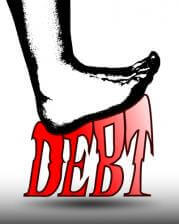Does Paying Off Credit Card Debt Improve Your Credit Score?
Find out whether you should pay off credit card debt and stop using the card in order to improve your credit score.

“To improve my credit score is it better to pay off my credit card and not use it anymore or to use it for major purchases only?”
Not getting the free Money Girl Newsletter? Sign up for money tips and advice!
ANSWER:
You get many benefits from using a credit card, like convenience, purchase protections, and rewards. But what many people don’t realize is that a credit card is also a powerful tool for building credit—when it’s used responsibly.
Here are 3 tips for how to use a credit card to improve your credit score:
Tip #1: Make Payments on Time
Paying your bills on time is generally the most important factor for maintaining or building a good credit score. There are many different credit scoring models and most of them give payment history the most weight when calculating a score.
So remember that being timely is critical, even if you can only make minimum monthly payments on your credit card. Of course, it’s better to pay off all your credit card charges each month, instead of just making minimum payments.
Paying your credit card bill in full is a smart strategy because you get to build credit, but skip the interest charges. Use tools like online bill pay and bill alerts to make sure that your payment due dates never fall through the cracks.
Related Content: How to Get Credit With No or Bad Credit
Tip #2: Don’t Use Too Much of Your Credit
Another important factor in how credit scores are calculated is how much of your available credit you’re using, which is known as your credit utilization ratio. The ratio is figured by dividing your balance by your available credit limit on revolving accounts, such as credit cards and lines of credit.
For instance, if you have a credit card with a $1,000 credit limit and your balance on the card is $600, you have a 60% utilization ratio ($600 / $1,000 = 0.60 = 60%). A low credit utilization ratio is better for your credit scores because it shows that you know how to use credit responsibly.
A good rule of thumb is to never rack up charges that exceed 20% to 30% of your credit limit—even if you routinely pay off your bill in full. If Rocio’s credit card balance gives him a credit utilization ratio that tops 30%, paying it down will definitely improve his credit score.
Related Content: Credit Utilization—What It Means for Your Credit Score
Tip #3: Use Your Credit
Though you shouldn’t use too much of your credit, you must use some of it regularly in order to maintain or improve your credit score! It’s impossible to demonstrate your creditworthiness and build a strong credit profile if you don’t use your credit accounts.
Additionally, if you let a credit card go idle for too long, the card company can cancel it for inactivity. That can hurt your credit because it drops the total amount of credit you have available, which increases your credit utilization ratio. A higher utilization ratio is a signal that you may have increased your total debt load—even if you really didn’t.
To sum up, it would be a smart move for Rocio to pay off his credit card. As I mentioned, you don’t need to carry a balance from month to month or pay any interest on a card to build credit.
But Rocio shouldn’t stop using the card altogether. At the very least, he should make a credit card charge (even just a small one) every month or so and pay it off in full and on time. That will keep the account active and continue to add positive payment history to his credit report.
Related Content: You Pay Off a Credit Card—Now What?
Other Articles and Resources You Might Like:
9 Things That Can’t Hurt Your Credit Scores
25+ Best Personal Finance Tools
7 Steps to Check and Correct Your Credit Report
How to Get Your Free Credit Score
Not subscribed to the free Money Girl podcast on iTunes? Click here to subscribe!
Stamp Debt photo from Shutterstock



